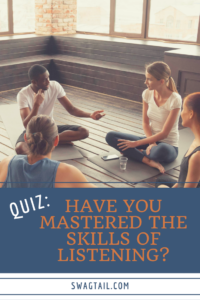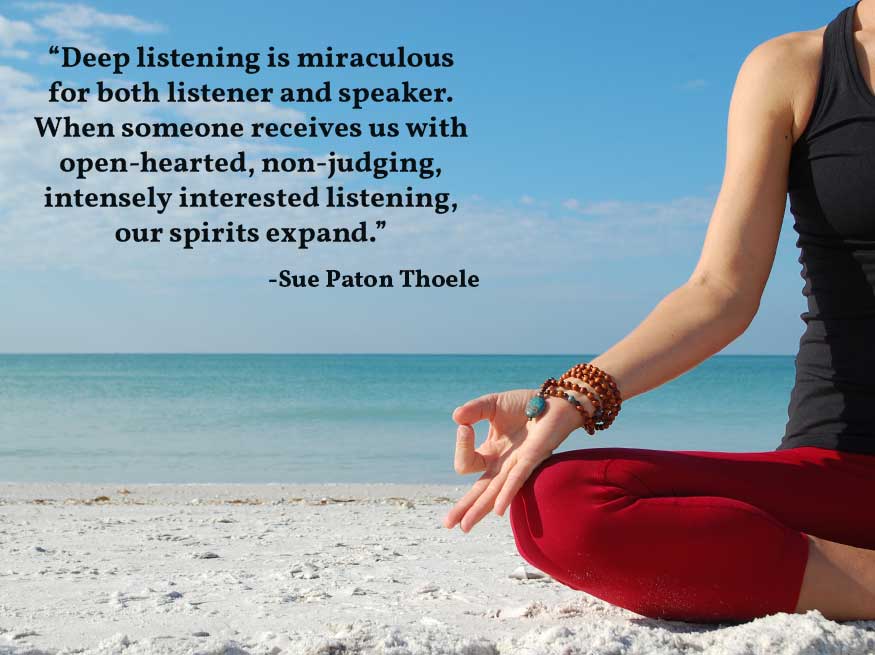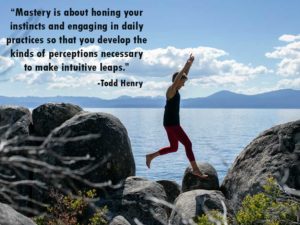
Communication with others happens countless times in a day. Yet, we rarely stop to reflect on the listening skills required to create harmonious relationships. The skills of listening can be especially important in the business realm because they affect how you relate to your students and colleagues. Mastering these skills can allow you to more effectively create win-win outcomes both on and off of the mat.
Years ago I wanted to start a yoga retail business with my best friend from college. I had a yoga mat design patented, and she brought some great scientific connections to enhance the stress-relieving qualities of our products.
At one point, a big decision needed to be made on how to approach our next level of expansion. I wanted to take more risk and grow into more distribution outlets. She wanted to take it more slowly, more safely. I was frustrated, and ordered more product despite her reservations.
As you can imagine, this caused my partner concern and created a sense of mistrust between us. Because I was unable to really hear what she had to say, and be able to listen to various alternatives in moving forward, our business relationship suffered. Eventually, we closed the company as we could no longer move forward in harmony.
This painful incident caused not only that business venture to cease, but it closed the door on our personal friendship, too. My hope is that you can shore up any weaknesses in your own listening ability to prevent such heartache from occurring in the first place. The quiz below will shed light on your current skills of listening. And, we’ll cover a few simple, yet powerful, steps you can take today to improve this important aspect of communication.
THE ART OF LISTENING
Clear communication plays a vital role in thriving relationships. Speaking your ideas with assertiveness and clarity is only half of this communication equation. The other half involves being a skilled listener.
Listening, though, is quite different from the physical act of hearing. The brain recognizes incoming sounds via the ears and then your conscious mind processes that information. The subconscious mind, which is full of pre-recorded programs, then selects which information to keep and store for later use. Usually, the information you keep fulfills certain needs or personal interests.
Essentially, your current life view, which is based on past experiences, selects what you really want to hear. Your ears might not discriminate the sounds that are heard, but your mind will select which information will be kept and stored.
Thus, listening is really a choice and being a skilled listener means you purposefully decide to expand your scope of inquiry, connection, and respect for others beyond your current, limited perspective. When you approach conversations like this, the possibilities for growth and expansion are endless.
BENEFITS OF BEING A SKILLED LISTENER
When you listen with attentiveness, you:
- Verify the message you receive is important
- Show respect for others
- Convey a non-judgmental attitude
- Confirm value in your relationships
- Connect with others intellectually and emotionally
- Receive new ideas
- Increase harmony, or rapport, in conversations

TEST YOUR LISTENING SKILLS
Listening, like yoga, is also a practice. While you may have been taught some successful tactics to improve your communication previously, it’s always nice to have a current assessment of those skills. You can then train yourself to improve in any areas that are currently weak.
PART 1 DIRECTIONS:
Read each sentence below, and imagine that you are listening to a person you enjoy. and mark the degree to which you already practice these supportive listening behaviors using a scale of 1-5. One (1) represents that this skill is rarely or never present. Five (5) reflects a frequent occurrence of the behavior.
- My primary goal when listening to others is to understand what they are saying. My secondary goal is to have the other person understand me.
- I make regular eye contact with the speaker.
- I ask questions when I don’t understand what they mean, or I want to know more about what they are saying.
- I show concern for others by acknowledging their feelings.
- I restate or paraphrase what I heard from someone to make sure I understand what they are saying.
- I am poised and emotionally controlled.
- My non-verbal body language, such as facial expressions and body posture, are appropriate to the conversation.
- My mind rarely wanders when I am listening.
- I respond to others with conscientious words and actions.
- I warn the speaker before changing subjects.
PART 2 DIRECTIONS:
Re-read each sentence above, and this time, imagine that you are listening to a person who is annoying or agitating. Mark the degree to which you already practice these positive listening skills using a scale of 1-5. One (1) still represents that this skill is rarely or never present. Five (5) reflects that it is a frequent occurrence of the behavior.
PART 3 DIRECTIONS:
Use the same sentences above, and this time have a close friend, family member, or spouse fill out their perspective about your listening skills. Make sure they have not viewed your answers before completing this section. Then, after you have received your score below, compare your responses with theirs. The answers might surprise you, and you might just find even more ways to enhance your skills of listening.

Photo Credit: Casey Brooke Photography
RATE YOUR LISTENING SKILLS
To determine your score, total your points in each section individually. (You will have a separate score for Parts 1, 2, and 3 above). Then, use the scale below to see where your skills as a listener rank at this time.
10-23: Enjoy a beginner’s mindset
There is definitely a learning curve when it comes to listening skills, and starting at the beginning can have wonderful benefits. You have have more zest as you work to improve your skills. You have space to explore ways in which listening can work new wonders into your relationships. And, while you might have to engage a bit more focus at first to build your listening skills, the positive momentum you create can have long-lasting benefits for your yoga business.
24-36: You’re advancing up the listening ladder
You are on the right path, and you’ve probably noticed some great results in your relationships already. Most often, you are able to receive the intended messages sent by others in a respectable, honest way. The practice now becomes a mixture of repeating what is already going well for you and consciously shoring up any areas where you are breaking, or losing, your connection with others.
37-50: You love to listen!
We, as humans, have two ears and one mouth so that we can listen twice as much as we speak. It seems you’ve learned this lesson, and are allowing your listening skills to uplift your relationships. Continue to celebrate each time you support others with your affirming behaviors. And, since there is always room for growth, allow the minor tweaking of your listening habits to further enhance your wonderful skill set.

Photo Credit: Diane Nicole Photography
THE PATH TO MASTERY
No matter where you find yourself on the scale above, more improvement is always possible. In fact, even pro athletes and touring rock stars return to the foundational elements of their success in order to stay sharp. Here are some simple and effective ways you can bolster your skills of listening this week:
AS A YOGA TEACHER:
Greet your students with purpose.
When you meet a new student for the first time, ask about their prior experience with yoga, their physical health, and any injuries that might limit their participation in class. Welcoming familiar students with questions also gives you a chance to listen to their changing needs. This reminds you to slow down, and remember that just because you have a relationship with someone already, their bodies and minds are in a new space than when you saw them last.
Add in moments of silence throughout class.
Incorporating stillness at the beginning of class can set the tone, and allow students to transition from their day into their practice. The silence in savasana incorporates the energetic changes made on the mat. Throw in some more quiet time while students are holding a posture and you not only allow yourself to listen to the energy of the room and the bodies of the students, but you allow your own inspiration to bubble to the surface.
Email your staff.
Many studios only receive feedback from their teachers when attending a yoga staff meeting. Why wait until you’re all together to find out how your team is doing? Send them an email this week. Ask how they are doing. Find out what is working in their classes. Ask how you might be able to be of service to them. You not only show that you care about them in this gesture, but your ability to listen to them beyond your physical conversations can build a stronger bond for your entire community.
AS A HUMAN BEING:
Create the space you need to grow forward.
Learning something new takes energy, and if you try to cram this new knowledge into your already-busy schedule, then it can be frustrating instead of enjoyable. To offset this complication, set some additional time aside before your conversations. Allow yourself some more quiet time in meditation, alone on a walk, or even time to read before bed. Then, notice what changes can truly blossom from the new listening seeds you’re planting.
Set an intention before you meet with others.
Each interaction you have throughout the day is different. Arrive early. Take a few deep breath. Focus on what it will take to be a good listener, bring to the forefront of your mind how you can excel at listening in the upcoming conversation. We do this on the yoga mat. Why not do them in many other areas of your life as well?
Improve one skill at a time.
Pick one listening skill in which you scored low above, and focus on it all week long. If you notice you feel impatient while others while they are speaking (mainly so you can get a word in edgewise), play the silent game and see if you can enjoy being quiet for a change. Are you often confused by what others say and too shy to speak up? Gather up your courage and practice asking lots of questions for clarification. You don’t have to perfect all aspects of listening at once. Instead, celebrate small victories one step at a time.
Read a book about communication.
We’ve discussed simple habits of assertive communication and tools to listen more effectively, there are many great resources available today that can also add more clarity to your conversations. Some of our favorites include:
- Louder than Words
- The Four Agreements
- Men are from Mars, Women are from Venus
- Everyone Communicates, Few Connect: What the Most Effective People Do Differently
PUTTING IT TOGETHER
The entire process of communication involves giving and receiving of messages, and it’s more common that we think about the speaking side of the equation than the listening one. However, your ability to hear what others have to say and honor their perspective (even if you don’t agree with them) plays a large role in the quality of your relationships. Consciously listening and engaging with others in this authentic way will not only grow your relationships, but benefit the other ones in your life, too.
Join us next week as we share what it takes to be a successful independent contractor, as well as how to embrace big magic on your yoga mat.









Leave A Comment